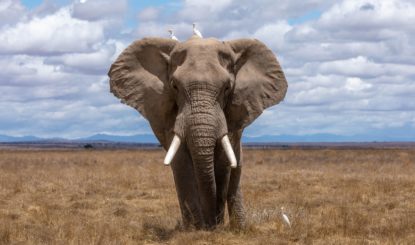Media Release: CITES Places a Moratorium on Live Elephant Exports from Africa
PANAMA CITY – At the 19th Conference of the Parties (CoP19) of the Convention on International Trade in Endangered Species of Wild Fauna and Flora (CITES), currently taking place in Panama, the 170 nations present have decided to temporarily halt the export of live elephants from Africa. The African countries will now enter into a dialogue to try to find common ground on the issue. Fondation Franz Weber (FFW), which has been working for the protection of African elephants since it was founded in 1975 and is an observer at CITES, will offer its expertise to the range countries in these upcoming discussions – and hopes that this interim solution will become permanent.
In 2019, the 18th Conference of the Parties (CoP18) decided to limit live elephant exports to in situ conservation areas, i.e. within the species’ natural range, except in exceptional cases. Convinced that exports of elephants to zoos on the other side of the world have absolutely no positive impact on the protection of the species, FFW welcomed and supported this decision. Despite the clear direction that the majority of CITES member states wanted to take, Zimbabwe and Namibia took advantage of legal uncertainties and continued to capture wild elephants to send them to zoos in China (2019) and the United Arab Emirates (2022).
A moratorium to allow dialogue
Several member countries of the African Elephant Coalition (AEC), an alliance of over 30 African countries, submitted a proposal to this year’s CoP19 to resolve this lack of legal clarity. However, the EU, preferring not to take a position, instead proposed to establish a dialogue between the AEC and those southern African countries wishing to sell their elephants. In the end, the CITES Parties chose the EU’s proposal – with one condition: a moratorium on all elephant exports from Africa while the ‘dialogue’ is ongoing. This landmark decision will temporarily protect elephants – at least until the CITES Parties make a final decision.
FFW has a long experience, both on the ground and at the international level, in the protection of elephants. It therefore hopes to be able to participate as an expert in the discussions between the AEC and the southern African countries, to try to secure a definitive ban on the export of live elephants to zoos abroad.
CoP19 rejects attempts to weaken elephant protection
In other good news from Panama, the CITES Conference of the Parties largely rejected all attempts by southern African countries to reopen international trade in elephant ivory. While just a few years ago such proposals found support among CITES member countries, it now seems clear that ivory belongs to elephants and the trade should remain banned.
Yet, FFW would have liked to see the protection of the African elephant further strengthened. In particular, the foundation supported a call from the African Elephant Coalition for Japan to close its domestic ivory market. This proposal was not adopted. However, FFW remains optimistic: “This is the last major legal domestic market still open, which will inevitably have to come into line with the rest of the world”, explains Vera Weber, FFW President.
CONTACT
- Anna Zangger, FFW International Campaigns Director
+41 76 306 48 59, annazangger@ffw.ch (French, English) - John Duhig, Senior EU Advisor
+32 76 318 57 91, johnduhig@ffw.ch (English) - Rosalind Reeve, Attorney at Law FFW & DSWF and Expert for CITES
+254 726 993 377, reeve@gmail.com - Keith Lindsay, Biologist and Elephant Expert
+44 7767 747 091, wklindsay@gmail.com (English) - Leonardo Anselmi, FFW Director Spain and Latin America
+34 634 503 583, leonardoanselmi@ffw.ch (Spanish) - Vera Weber, FFW President
+41 79 210 54 04, veraweber@ffw.ch (German, English, French, Spanish)


